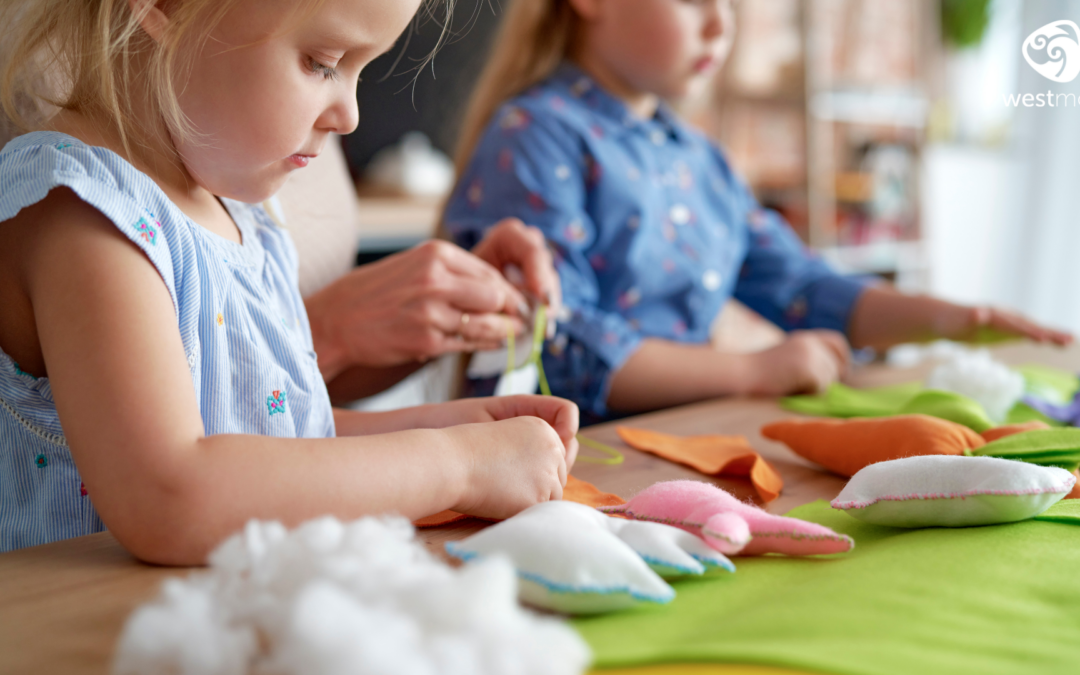The Pursuit of Creative Thinking
How the Montessori Method Fosters Innovation from Preschool to Grade 12
Creativity isn’t just an artistic endeavor—it’s a mindset that empowers individuals to see the world differently, solve problems uniquely, and express themselves fully. In the sphere of education, the Montessori method stands out as a pioneering approach that nurtures creative thinking every step of the way, from preschool to grade 12. Let’s explore how Montessori schools cultivate a culture of innovation through hands-on activities, progressive learning techniques, and the integration of cutting-edge technology.
Preschool: Laying the Foundation with Hands-On Learning
In Montessori preschools, creativity begins with the senses. Here, young learners are encouraged to explore the world through hands-on activities like sewing and pinning. These tasks are not just about developing fine motor skills; they are designed to foster independence, problem-solving, and, most importantly, creative thinking. Through such activities, children learn to see materials and tools not just for their conventional uses but as doorways to endless possibilities.
Elementary: A Spectrum of Creative Pursuits
In Montessori elementary classrooms, the emphasis on creativity broadens significantly, offering students a vast spectrum of activities that engage their inventive capacities. While art and coding serve as vivid examples, they are merely points within a constellation of creative endeavors designed to cultivate diverse thinking, problem-solving skills, and self-expression.
Engaging in art allows children to explore their imaginative capabilities through various mediums, understanding the world through colors, textures, and form. Meanwhile, coding challenges them to think logically and creatively in solving computational problems. However, these activities represent just a fraction of the opportunities available.
Music, storytelling, science experiments, and drama are other pillars within the Montessori curriculum that encourage creative thinking. Music composition and performance teach rhythm, pattern recognition, and emotional expression. Storytelling and drama invite students to step into different perspectives, enhancing empathy and collaborative skills. Science experiments offer hands-on exploration of the natural world, sparking curiosity and inventive thinking by questioning how and why things happen.
Additionally, traditional academic subjects are approached from creative angles. Mathematics is learned not just through exercises but through practical applications and manipulative materials that reveal the beauty and creativity inherent in the subject. Geography and cultures are explored through imaginative projects and global awareness activities, encouraging students to think creatively about their place in the world and the diversity of human experience.
Through these diverse activities, Montessori elementary students learn that creativity is not confined to any single discipline but is a versatile tool that enhances learning and problem-solving across all areas of study. This multifaceted approach prepares students not only for academic success but for a lifetime of creative thinking and innovation.
High School: A Focus on Creativity and Creative Thinking
At the high school level, Montessori education emphasizes a revolutionary approach to learning that deeply values creativity and critical thinking. This phase of education is designed to prepare students for the future by encouraging independent thinking and adaptability.
Innovative Classrooms for Creative Minds
Our innovative classrooms serve not just as physical spaces but as incubators for creativity. Here, students are not merely recipients of information but active architects of their own education. This environment fosters a mindset shift, embracing the limitless potential within every student to innovate and create.
Tailored Projects That Nurture Creativity
The Montessori high school curriculum is uniquely designed to allow students to explore their interests deeply, blending these with academic requirements to undertake personalized projects. From planning to execution, the curriculum encourages students to take ownership, promoting self-directed exploration and critical thinking. This approach ensures that each student’s learning journey is both personalized and deeply imbued with creative thinking.
Real-World Applications of Creative Thinking
Through their capstone projects, students apply their creativity to real-world problems, preparing presentations that combine rigorous academic research with engaging narrative styles. These projects underscore the importance of creativity across all disciplines, highlighting its role in problem-solving and effective communication.
This tailored approach to education, focused on fostering creativity and critical thinking, prepares students to be innovative thinkers and problem solvers, ready to face the challenges of the future with confidence and ingenuity.
Conclusion: Embracing Creativity from Elementary through High School
Our Montessori approach aims to nurture creativity and critical thinking across all stages of education, recognizing these skills as foundational for adapting to and thriving in a rapidly evolving world.
A Continuum of Creative Learning
Starting in the elementary years, we introduce students to the concept of creative exploration, providing them with the tools to ask questions, envision solutions, and engage in hands-on learning. This ethos is carried into the high school years, where the focus shifts toward deeper, self-directed projects that allow for the application of creativity in more complex and varied contexts.
Broadening the Scope of Creativity
Throughout a student’s journey, we emphasize that creativity is not confined to artistic endeavors but is a versatile skill applicable across subjects, from the sciences to the humanities. It’s about fostering flexible thinking and problem-solving abilities that students can carry forward into any field of study or career path.
Preparing for Future Challenges
Our goal is to prepare learners who can think critically and creatively about the challenges they will face in the future. By embedding these skills in our curriculum, we hope to encourage students to approach problems with innovation and a readiness to explore new solutions.
Montessori education is centered on the belief that nurturing creativity and critical thinking from an early age equips students with the resilience and adaptability they need for the future. While we are proud of our approach, we are constantly seeking to learn and improve, ensuring that our students are well-prepared to navigate an unpredictable global landscape with confidence and a creative spirit.

